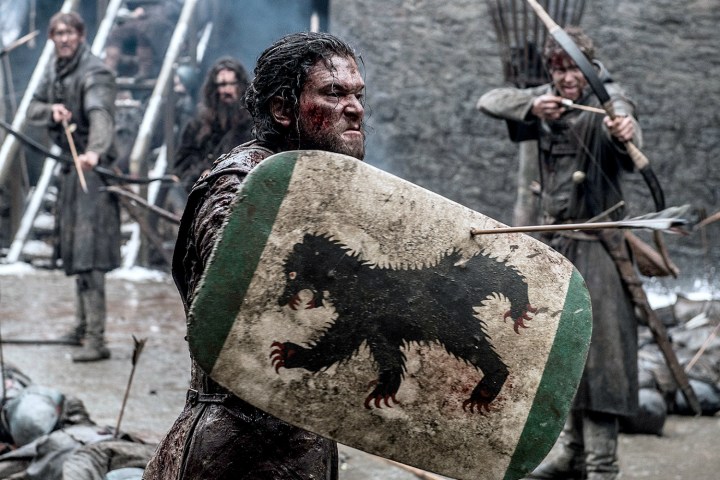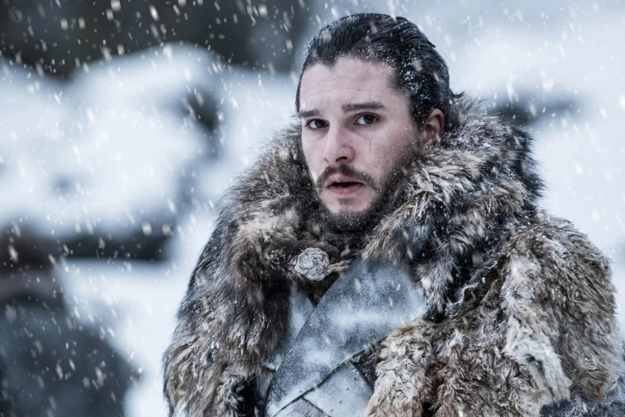
As implied by the title, the episode features the inevitable clash between eponymous bastards Jon Snow and Ramsay Bolton, both vying for control of Winterfell. Although Game of Thrones is typically a sprawling affair, with a multitude of characters and stories, this episode is admirably focused, almost entirely tracing the battle in question to create an adventure light on plot but heavy on awesome spectacle.
A prelude in Meereen
Of course, Game of Thrones is also well known for sticking knives into its viewers, and so Bastards opens with a return to Meereen. When last the show checked in, Daenarys had returned to find the city under siege. The Masters, afraid that Meereen’s influence would lead to the end of slavery, had lain siege to the city despite negotiating a peace treaty with Tyrion.
Tyrion is naturally skittish around Daenarys, trying to explain that his policies had brought Meereen to a new level of prosperity, something that prompted the Masters to attack. He convinces Daenarys, and moreover, persuades her to abandon her plan of crucifying the Masters and all their troops. Instead, he offers a different path.

The plan in question is one of shock and awe. The three main Masters arrive to negotiate a surrender, Daenarys has her dragons set fire to a few of the Masters ships, and Grey Worm assassinates two of the more conniving Masters, leaving the third to return to his people and warn them that Daenarys is too mighty for them. It is a quick (and brilliantly dragon-filled) end to the lesser of tonight’s battles, but the audience is not yet granted a reprieve.
After the siege, Theon and Yara show up, offering Daenarys the Greyjoy ships in exchange for her help in securing the Iron Islands for Yara. Although Tyrion is disgusted by Theon, Daenarys and Yara strike up a strange rapport, both being the daughters of cruel kings, hoping to lead their people to a better future. Yara pledges the ships and also swears to support Dany’s claim, as well as agreeing that the Ironborn will no longer raid Westeros. Meereen has long been a weight tied around the series’ ankle, something that holds true for the books as well, but it seems Dany will — at long last — make her approach to Westeros.
Jon and Ramsay play mind games
With the siege in Meereen wrapped up, the show returns to the North for the duration. On a worn, gray field, Jon, Sansa, and their allies meet with Ramsay and his. It’s startling to see Ramsay involved in any sort of parlay, but then, neither side views it as a chance for actual negotiation. Ramsay, his cheeks puffing ever slightly in his smug smile, offers Jon the chance to surrender and go on living. Jon challenges Ramsay to a duel, which would avoid the unnecessary bloodshed of a battle.

Ramsay doesn’t accept Jon’s challenge, but as Jon explains after, it was never expected. He is trying to get under Ramsay’s skin and make him look weak in front of his allies, and it seems to work. So used to dealing with captives and servants, Ramsay seems genuinely unsettled at someone so openly challenging his masculinity. The two sides break off, but not before Ramsay reminds them that he still has Rickon Stark in his dungeon.
One last night passes before the battle, and Jon, after arguing with Sansa over their lack of troops, goes to Melisandre for advice. The priestess has none to offer, however, saying that he will live or die by god’s will. Outside of resurrecting Jon, Melisandre has been a mostly forgotten presence this season, and her fatalistic view of religion does little more than remind Jon and the audience that victory will have to be earned without any supernatural help.
Davos, walking the camp to clear his mind, finds the toy stag he gave to Stannis Baratheon’s daughter Shireen in the burnt out pyres. One of the questions looming over the Northern storyline has been what happens if Davos finds out that Shireen was sacrificed to the Lord of Light, a conflict for which the show lays the groundwork here.
The battle begins
On the day of the battle, Jon and Ramsay line up with their troops, and the show takes one last opportunity to remind the audience that Ramsay is, in fact, extraordinarily evil. Ramsay brings out Rickon and tells him to run to Jon. All the while, Ramsay will fire arrows at him. Jon races out to meet Rickon, and just when he is within reach, Ramsay shoots the younger sibling through the heart. The show draws out the tension, with Jon and Rickon coming so close before the arrow suddenly pierces his chest. The scene borders on melodrama, its only purpose seemingly to end Rickon’s part in the story, and to make Jon more motivated.

Sparing no time to mourn his half-brother, Jon charges at Ramsay’s line. Ramsay, meanwhile, orders his troops forward. The scene is ominously quiet, despite being the opening of a battle, and for a brief time it seems as if Jon is going to take on the whole army by himself. Then his troops pass him, crashing into the Bolton forces.
So much is said about the plot of Game of Thrones, its twists and big reveals and shocking atrocities, that its visual aspects are sometimes overlooked. No show has a more manic visual design, as evidenced by the sharp contrast between the grimy but well-constructed sets and costumes of Westeros and the cheap, gaudy, ’90s fantasy look of Dorne and Meereen. At its best, it is the most well-composed fantasy show in television history, and on par with more than a few fantasy movies. The start of the battle fits that bill, with a long take of Jon stumbling through the chaos, hacking at an enemy soldier, dodging a blow from another, all while mayhem reigns in the background. Between the long take and the muddy combat, the scene bears a strong resemblance to the famous Normandy assault in Saving Private Ryan, an homage that few shows could pull off.

The Battle of Winterfell is a long, gory affair, and while scenes of men holding their guts in as they form a pile of bodies may seem like a tawdry way to show that war is hell, they manage to work here. Jon is the emotional anchor that keeps the slaughter from seeming pointless; covered in blood and mud over the course of the battle, his mere presence reminds the viewers of the personal stakes of this battle, a welcome change from the senseless violence that the show often displays.

Although George R.R. Martin’s story became famous for subverting the structures and cliches of fantasy, the battle ends with a well-worn twist. Although Jon’s men fight hard, they are eventually surrounded by Bolton troops, who press in on them using shields and spears. The fighting becomes much slower as the Wildlings try to break the Bolton ranks, and it seems like all might be lost. Then, a horn sounds, and Ramsay turns to see that the cavalry has arrived. The knights of the Vale — likely summoned by the mysterious letter Sansa wrote in episode 7 — arrive to shatter the Bolton formation.
Ramsay flees to Winterfell, Jon in pursuit. Locking the gate behind him, Ramsay plans to hold out in Winterfell, and thankfully the show crushes his plan immediately, as Wun Wun the giant punches through the gate. The Wildlings push in, and Wun Wun falls, having suffered a number of wounds, including a final, ignoble arrow to the eye. Ramsay offers Jon the mano a mano fight he asked for, taking shots at Jon who picks up a shield and closes in.
The cruel and cathartic death of Ramsay Bolton
For a while now, Ramsay has been the closest thing to a main villain that Game of Thrones has. The show has long delighted in putting the screws to the viewer, showing Ramsay’s many atrocities and teasing the audience with some far-off retribution. Thus, his defeat here is cathartic in how brutal and pathetic it is. Jon pummels Ramsay, leaving him a bloody mess, and as the Stark troops take down the Bolton banners, Sansa gets her final revenge on the man who once brutalized and raped her. In the episode’s final scene, Ramsay is tied up in the kennels, and tries to taunt Sansa. Although he will soon be executed, he claims that he will always be a part of her. Sansa tells him that his house will be wiped out, and all memory of him will be erased as well.
Ramsay’s ultimate fate is wickedly poetic. He is tied up in the kennel with his dogs, to whom he has fed so many people, and as Sansa points out, had not been fed in a week. Although the camera holds back from showing Ramsay being eaten alive, there is enough sound to leave things unambiguous. After six seasons of cruel deaths for characters who generally did not deserve them, the sick and twisted death of the sick and twisted Ramsay Bolton is satisfying, which perhaps says something about the show’s effect on one’s psyche.
While Game of Thrones has always used its penultimate episode for big, flashy events, the finale is usually a denouement, wrapping up loose ends as characters deal with more emotional problems. The Battle of Winterfell leaves a lot of cleaning up to do, and will likely have reverberations throughout the Seven Kingdoms. The Starks control Winterfell again, and Jon Snow is a war hero. What will this news stir up when it reaches King’s Landing? How easy will it be for the Starks to rebuild the North? There are a lot of questions going into next week’s season finale — here’s hoping the show sticks the landing.
Editors' Recommendations
- 5 years ago, Game of Thrones aired its last great episode. Here’s why it still holds up
- The best Game of Thrones seasons, ranked
- The Red Wedding at 10: How the groundbreaking episode changed Game of Thrones forever
- How House of the Dragon saved Game of Thrones’ tarnished legacy
- Game of Thrones deserves to be a great video game like Elden Ring


